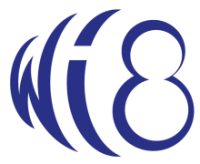 ABA president Becky Anderson called Daniel Pink, whose new book is To Sell Is Human: The Surprising Truth About Moving Others (Riverhead), a "Winter Institute superstar" as she opened the first plenary session at the event in Kansas City.
ABA president Becky Anderson called Daniel Pink, whose new book is To Sell Is Human: The Surprising Truth About Moving Others (Riverhead), a "Winter Institute superstar" as she opened the first plenary session at the event in Kansas City.
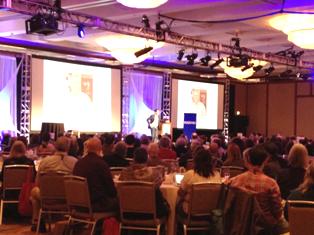 |
| photo: Steve Rosato |
When the ABA asked him to return to the Winter Institute as a speaker, Pink said he set a few conditions: that the Winter Institute be held in Kansas City in February; his session take place in a windowless room; and that it start at 8 a.m. on a Saturday. Despite bad weather, a lack of windows and the early hour, booksellers packed the event to hear what the author who last wrote about drive and motivation in the business world had to say about sales.
"Like it or not, we are all in sales now," said Pink. Even the eight out of nine workers who say sales is not part of their jobs spend much of their time convincing others to do things, he explained. Booksellers, for instance, sell more than just books; they also sell their stores to their community.
He discussed the public's traditional attitude about sales. A survey of 7,000 people asked the respondents to use one word to describe sales. Among the top answers: pushy, sleazy, slimy and cheesy. ("To me, they always sound like the dwarves who didn't make the cut," Pink said.) Booksellers have similar feelings about sales.
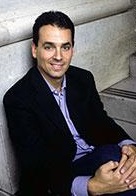 |
| Daniel Pink |
But in a new world where sellers no longer have the monopoly on information, said Pink, the "buyer beware model," which conjures up the image of a used car salesman, is no longer the norm. Buyers now have vast amounts of information at their fingertips. For example, most car buyers now know the dealer invoice price of cars, which once was so secret even dealer salespeople didn't know. The ABCs of selling--"Always Be Closing"--touted by Alec Baldwin's character in Glengarry Glen Ross, the movie version of David Mamet's play--need to be replaced with "Attunement, Buoyancy and Clarity," Pink said.
Attunement, Pink said, involves not only being able to take in another's perspective but also mimicking it back to them. Buoyancy is about "facing an ocean of rejection" and figuring out what to do before, during and after each interaction with customers. And, clarity, Pink said, means shifting from a "problem solving" approach with customers to a "problem finding" approach.
"If you can identify problems people don't even know they have, that's where all the action is," Pink said. "And that's where all the margins are."
Contrary to popular belief, research shows that extroverts are not measurably better at sales than their introverted counterparts, Pink said. Instead, the ideal salesperson is an "ambivert": a person who is a balance of introvert and extrovert, a person who "knows when to talk and when to listen."
The lesson for booksellers, Pink said, is that "changing people's minds matters less than giving them an easy off ramp." He suggested that bookstore sales might go up if staff members had an iPhone with a Square credit card payment attachment that gives consumers an easy off-ramp to purchase. Particularly with e-book purchases at independent bookstores, he observed, "it's too hard to act" and take the off ramp.
Noting that sometimes it's difficult in a bookstore to tell who is a bookseller, he also suggested booksellers wear T-shirts identifying them as staff. The T-shirts could be designed by the booksellers.
Pink also shared advice he solicited from other bestselling business writers and leaders he collected specifically for his Winter Institute audience. David Allen, author of Getting Things Done: The Art of Stress-Free Productivity, suggested bookstore staff might wear "Ask me what I am reading T-shirts," much as employees at an upscale clothing stores wear the merchandise. Some, like Seth Godin, author of The Icarus Deception: How High Will You Fly?, pointed out that a curated experience is better than a search experience in retail.
Brothers Chris and Dan Heath, authors of Made to Stick: Why Some Ideas Survive and Others Die, suggested having "guest curators" create book playlists. As Pink explained, a store in Kansas City might ask what the CEO of its corporate neighbor Hallmark is reading. Tom Rath author of Strengths Finder 2.0, said booksellers should practice "extreme curation," presenting the next book a customer needs, not hundreds.
The common theme with the advice--and what Pink said will distinguish bricks-and-mortar booksellers from any retailer that uses an algorithm--is to switch from giving customers a "search experience" to a "discovery experience."
Going back to the distaste people have for sales and selling, Pink said, "We are now in a world of servant sellership." It is a world in which independent booksellers can do really well, if they create easy off ramps.
Quoting Godin, Pink said, "Maybe it's less important to be efficient than to be brave." --Bridget Kinsella
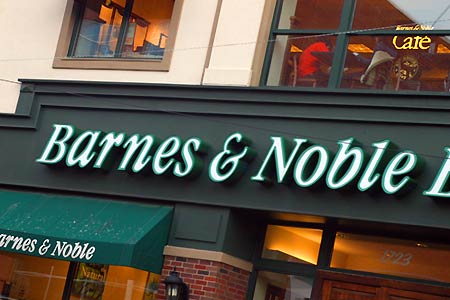 Leonard Riggio, Barnes & Noble's chairman and largest shareholder, with 30% of the company's common stock, is exploring the possibility of buying out B&N's bookstore chain.
Leonard Riggio, Barnes & Noble's chairman and largest shareholder, with 30% of the company's common stock, is exploring the possibility of buying out B&N's bookstore chain. 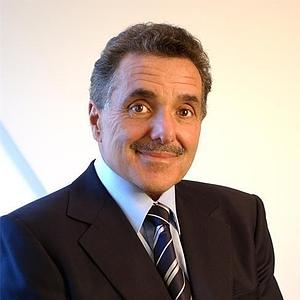 In a filing with the SEC today, Riggio notified B&N's board of directors that he "plans to propose to purchase all of the assets of the retail business of the Company. The retail business would include, among other things, Barnes & Noble Booksellers, Inc. and barnesandnoble.com; and would exclude NOOK Media LLC (comprising the digital and College businesses)."
In a filing with the SEC today, Riggio notified B&N's board of directors that he "plans to propose to purchase all of the assets of the retail business of the Company. The retail business would include, among other things, Barnes & Noble Booksellers, Inc. and barnesandnoble.com; and would exclude NOOK Media LLC (comprising the digital and College businesses)."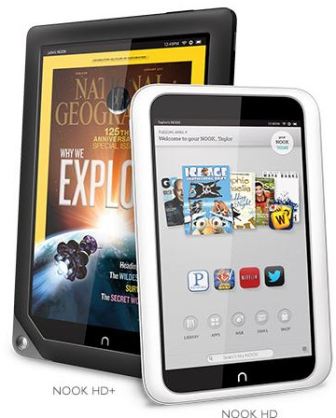









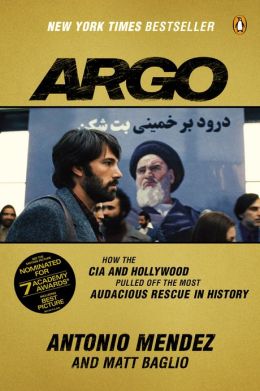 Argo, based in part on The Master of Disguise: My Secret Life in the CIA by Antonio Mendez and events chronicled in Argo: How the CIA and Hollywood Pulled Off the Most Audacious Rescue in History by Antonio Mendez and Matt Baglio, won Oscars for best picture, editing and adapted screenplay (Chris Terrio).
Argo, based in part on The Master of Disguise: My Secret Life in the CIA by Antonio Mendez and events chronicled in Argo: How the CIA and Hollywood Pulled Off the Most Audacious Rescue in History by Antonio Mendez and Matt Baglio, won Oscars for best picture, editing and adapted screenplay (Chris Terrio). 
 The snowstorm that dropped nearly 10 inches of snow in Kansas City, Mo., the day before Winter Institute 8 began caused many people to arrive late--and a few to miss the event entirely. But for most, the weather problems just added to the traditional spirit, energy and camaraderie of the Winter Institute, one of the most popular book world gatherings, launched by the American Booksellers Association in 2006. Independent booksellers are a hardy bunch, and the feeling seemed to be that after successfully handling so many other challenges, what was a few hours' delay in travel or a flight rerouting or an unexpected overnight in Houston or Chicago? To add to the fun, another snowstorm is predicted for today and tomorrow.
The snowstorm that dropped nearly 10 inches of snow in Kansas City, Mo., the day before Winter Institute 8 began caused many people to arrive late--and a few to miss the event entirely. But for most, the weather problems just added to the traditional spirit, energy and camaraderie of the Winter Institute, one of the most popular book world gatherings, launched by the American Booksellers Association in 2006. Independent booksellers are a hardy bunch, and the feeling seemed to be that after successfully handling so many other challenges, what was a few hours' delay in travel or a flight rerouting or an unexpected overnight in Houston or Chicago? To add to the fun, another snowstorm is predicted for today and tomorrow. 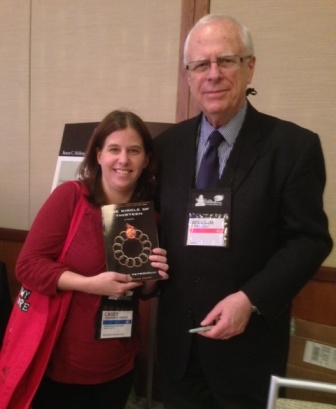



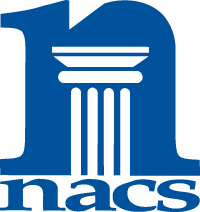 The big news at the National Association of College Stores annual meeting and
The big news at the National Association of College Stores annual meeting and  Alan Van Ongevalle has been promoted to president and chief operating officer of Hastings Entertainment. He was formerly executive v-p of merchandising and has held a variety of positions, involving, among other things, managing stores, opening stores, marketing and advertising. He is a great example of someone rising through the ranks: he joined the company in 1992 as an intern.
Alan Van Ongevalle has been promoted to president and chief operating officer of Hastings Entertainment. He was formerly executive v-p of merchandising and has held a variety of positions, involving, among other things, managing stores, opening stores, marketing and advertising. He is a great example of someone rising through the ranks: he joined the company in 1992 as an intern.
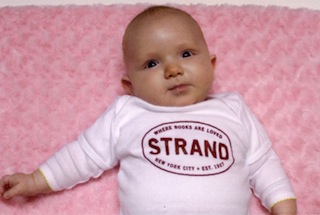 Last week, Scarlett Willa Bass-Wyden, who was born in November to Nancy Bass Wyden, owner of the Strand Bookstore, New York City, and her husband, Senator Ron Wyden (D.-Ore.), visited the Strand for the first time. A third-generation bookseller, she was immediately put to work modeling the store's new line of
Last week, Scarlett Willa Bass-Wyden, who was born in November to Nancy Bass Wyden, owner of the Strand Bookstore, New York City, and her husband, Senator Ron Wyden (D.-Ore.), visited the Strand for the first time. A third-generation bookseller, she was immediately put to work modeling the store's new line of  Racked New York suggested that readers could "
Racked New York suggested that readers could "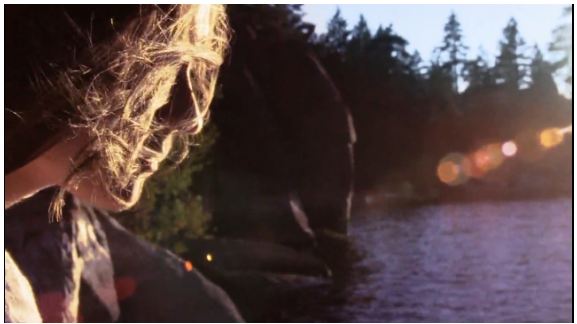 The Demonologist: A Novel
The Demonologist: A Novel

 In our review of
In our review of